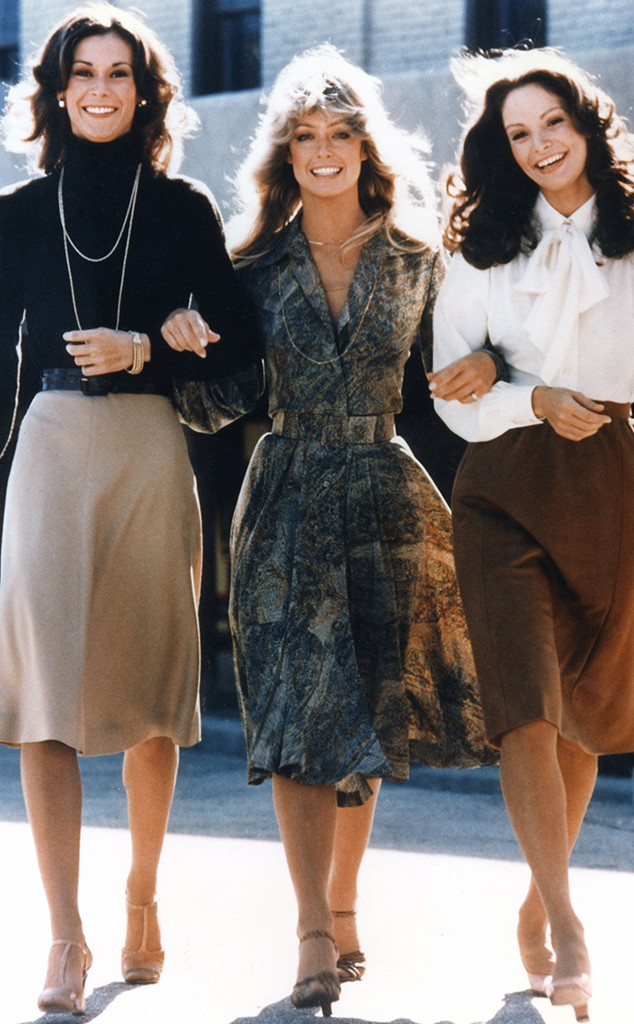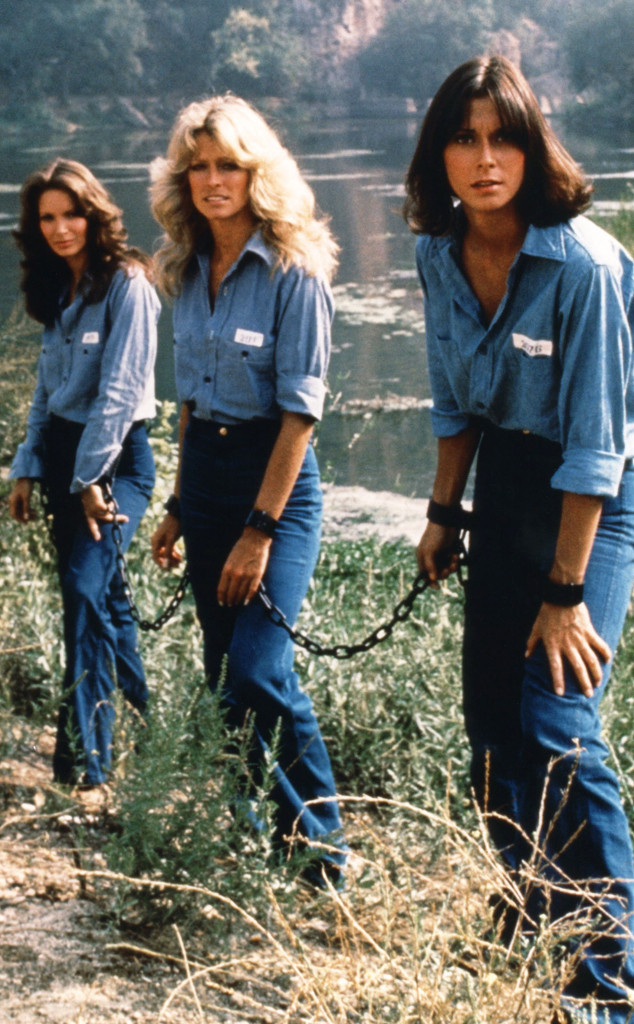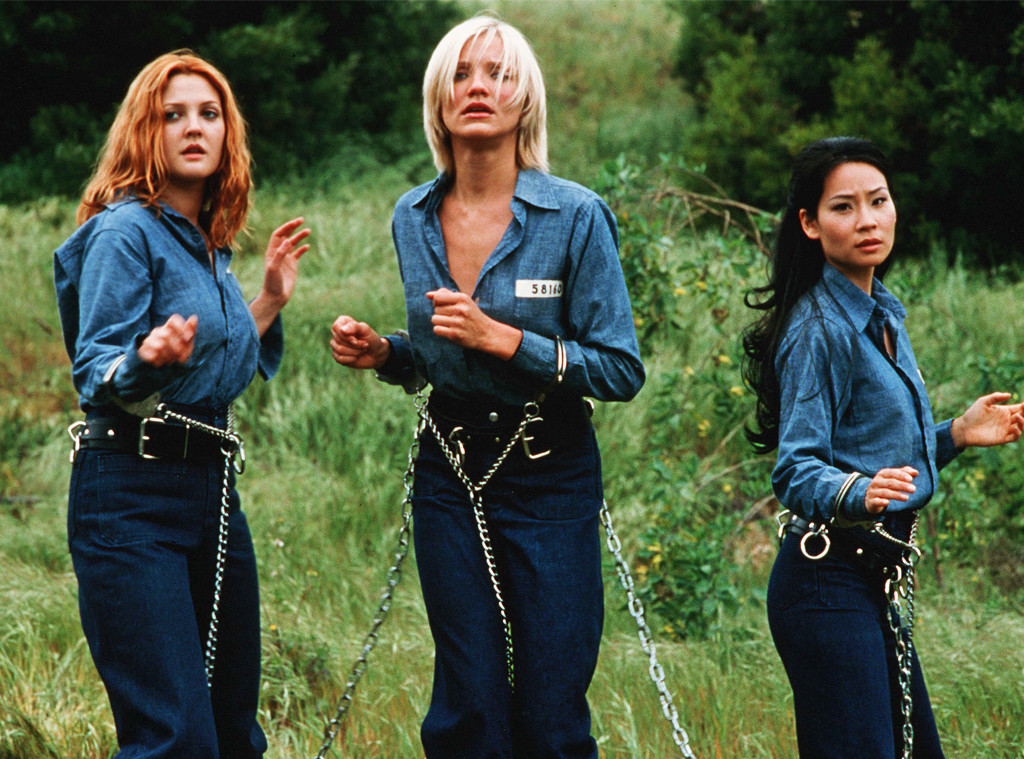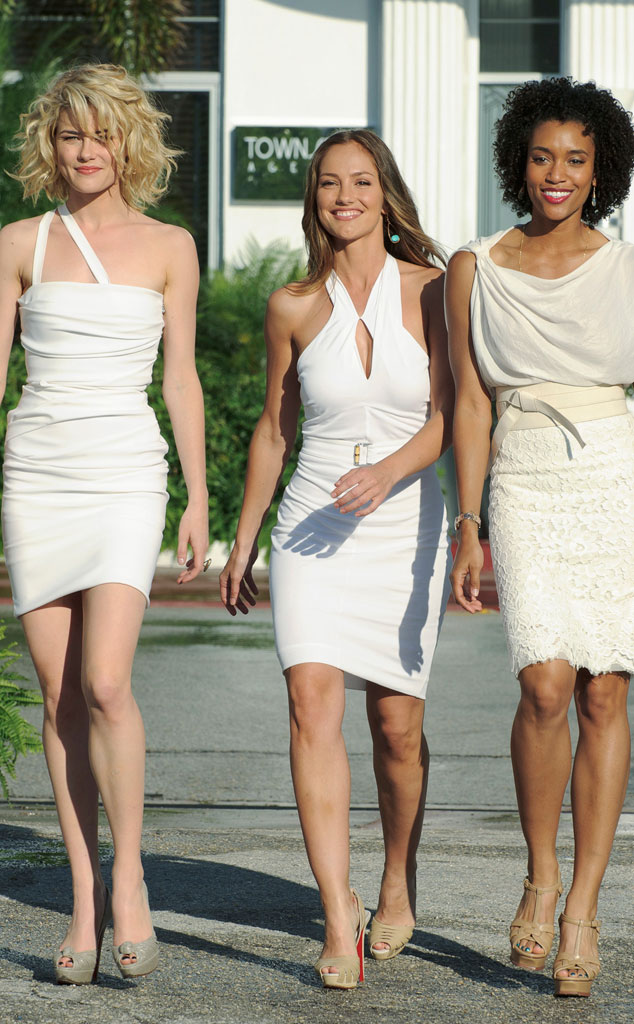The names and hairstyles have changed, but the intent behind Charlie’s Angels remains the same.
Women can kick as much, and often times much more, ass than men, especially in threes.
The latest incarnation of the now 43-year-old story lands in theaters Friday with a very modern twist—though the focus will be on the three principals played by Kristen Stewart, Naomi Scott and Ella Balinska, it turns out there are many ladies detecting for the Townsend Agency in an interconnected network spanning the globe, with multiple Bosleys and some phenomenal gadgets aiding in their quest.
“These bitches are taking it back,” Stewart affirmed on The Howard Stern Show last week. “Any woman in power in our movie—probably an Angel.”
Moreover, “Charlie is a movement in our movie. It’s not like a man who owns a company and owns a bunch of women that he sends out to do his bidding. We run the company.”
He’s still also a guy, though, voiced by Robert Clotworthy, who takes over from the late John Forsythe, the Dynasty star having provided the disembodied voice of Charlie in the original 1976 series and the 2000 and 2003 films starring Cameron Diaz, Lucy Liu and Drew Barrymore. (Victor Garber did the honors in the short-lived 2011 series.)
Charlie, of course, never owned the women, but their lives did revolve around him, sight unseen.
Watching the now 19-year-old Charlie’s Angels film, let alone the 40-year-old series, shows how far the concept of crime-fighting babes has come, even if at the end of the day we’re still buying tickets to watch crime-fighting babes.

Moviestore Collection/Rex/REX USA
“There’s a little room for improvement,” Farrah Fawcett, her hair fluffed to the heavens, said on The Merv Griffin Show in November 1976 when Griffin raved about the success of Charlie’s Angels. The Aaron Spelling production had just premiered that September to big ratings and the derisive term “Jiggle TV,” inspired by Fawcett, Kate Jackson and Jaclyn Smith‘s perky physiques and the persistent myth that they never wore bras.
“You’re never supposed to say that,” Griffin said conspiratorially. “Oh, well I think it’s very good,” Fawcett clarified. But “when you go home and maybe watch the show, you think, ‘I could have been a little bit better, maybe something could have been a little better.’ And that’s good, because it shows that you care and you want it to be better—and maybe it will be.”

Spelling-Goldberg/Kobal/Shutterstock
In the original show, Jill Munroe (Fawcett), Sabrina Duncan (Jackson) and Kelly Garrett (Smith) were Los Angeles Police Academy graduates who were recruited, thanks to their special skill sets, to join the Charles Townsend Agency as private investigators. They carried adorable little guns (unwittingly spawning thousands of photos of high school girls doing that gun pose with their hands) and could outsmart or karate-chop any villain unfortunate enough to come their way.
And though it was acknowledged by its creators to be “fantasy television,” one in a long line of thematically similar Spelling productions that were increasingly unrealistic but eminently watchable, it was nice to see some heroines for a change amid all the prime-time heroes, including Fawcett’s own husband, Lee Majors, who was starring in The Six Million Dollar Man at the time.
But also because they were women, the stories emanating from the set were your typical rumors of rivalries and petty feuds among the leading ladies. Asked if it was true that production was regularly held up due to disagreements over who was going to wear what in which scene, Fawcett laughed.
Recalling how TIME magazine was on the set doing a story and wanted photographs of them all in front of the mirror, brushing their hair and whatnot, Fawcett told Griffin, “Working on the show, to me, is great with the other girls, because it takes me back to when I had roommates in college.”
“It’s fun,” she added, “there’s no hostility, but it’s like anything. I’m sure when I had roommates that I loved very much, there was always something about somebody that you think, ‘Why does she insist on doing that?'”

Harry Langdon/Getty Images
But the show didn’t get better enough for Fawcett’s taste. She hadn’t always wanted to be an actress—she was an art history major in college who continued to paint and sculpt—but once she was, she wanted to improve with time.
So though she’s the most iconic name associated with the show’s original five-season run on ABC, Fawcett only stuck around for that first season, breaking her five-year contract and getting sued (she would return for a handful of guest-star appearances). She was replaced by Cheryl Ladd, playing Jill’s younger sister Kris Munroe.
Jackson, who was nominated for two Emmys, stayed for another two seasons before getting fired after not taking the news well that she wouldn’t be allowed time off to be in Kramer vs. Kramer. (Instead they got Meryl Streep, who won the first of her three Oscars.)
“I guess I did cause a few problems,” Jackson told People in 1979. “What it comes down to is I got tired of them and they got tired of me. I’m glad I’ve finally been able to hang up the halo.”
Shelley Hack, as Tiffany Welles, came on for season four, followed by Tanya Roberts as Julie Rogers, who closed out the series with Ladd and Smith.
But no offense to those who solved crimes in Jill Munroe’s wake, the dynamic among the original cast members is what has held the public’s fascination for decades.

Spelling-Goldberg/Kobal/Shutterstock
“We were Southern girls: Farrah and I were from Texas, Kate’s from the South, and there was sort of a bond among the girls where it wasn’t really competitive at all,” Smith, who has a cameo in the new film, recalled to NBC Connecticut in 2012. “We just really liked each other, we got along, and we fought as much for our free day and unstructured time as for screen time.
“So I think that made it work, that we were not overly driving, ambitious girls. We were having fun, and I think that showed up on the screen. You start something together and there is a bond, and it’s a hit—and hits are not as commonplace as we think they are, so that was special in itself. The show really took off and it was really unique and different, and it was not three men, it was three women. And the prototype for women had been June Cleaver, the prototypical housewife, and here we were getting the bad guy, and emotional and financially independent women.”
And even though part of the deal was that Jill, Sabrina and Kelly had to be endlessly sexy as well as clever, Smith insisted that the real takeaway was that three women starred on a network prime-time show in which men were relegated entirely to supporting roles, and the characters obviously had no issue taking care of themselves. Moreover, the original Charlie’s Angels was downright tame by contemporary norms. They were relatively covered up in the slacks-and-blouses style of the day, and Jackson refused to wear a bikini, insisting on more practical outfits for Sabrina in her ongoing quest to elevate the material.
“If you look at our show compared to what’s happening today, we look like we were a show from the ’50s. That’s the difference,” she said. “It was really the bond of the girls. I don’t know why the feminists would be angry because we were doing our thing, making our way, supporting ourselves, getting the bad guy, and it was never meant to be over-analyzed. It was meant for pure entertainment. There was a glamour element, there were pretty locations, but—nah. I think [the idea] that we were sexually exploited was ridiculous. And I never felt sexually exploited…
“We felt that we were independent women, strong women, empowered women.”
And that is the spirit in which Cameron Diaz, Lucy Liu and Drew Barrymore banded together to make the 2000 movie—which was unquestionably badass in its time and is still fun but also about as through-the-male-gaze as it gets, the still-resonant power of the theme song, “Independent Women Pt. III” by Destiny’s Child, aside.
Natalie (Diaz), Alex (Liu) and Dylan (Barrymore) ditched the guns and relied solely on martial artistry, technological (and engineering, mechanical and ornithological) know-how, street smarts and an unending supply of outfits, wigs and masks to solve their cases. Matrix-style fight scenes were having a real moment, and Bill Murray as Bosley and Kelly Lynch and future Oscar winner Sam Rockwell as baddies could only help, and the movie made $264 million worldwide.
Alas, that meant there was a sequel that added Demi Mooreas a fallen Angel to the mix, but while Charlie’s Angels: Full Throttle made just as much money, it suffered from the let’s-do-the-same-only-not-as-good-and-with-more-clothes issues that plague so many sequels.
Needless to say, like the original Charlie’s Angels, which was created by men, directed and written almost entirely by men, and which boasted one female associate producer, the 2000 and 2003 movies were directed by action expert McG, and one woman, Marianne Wibberley, has a screenwriting credit between the two films, and she was one of three who worked on Full Throttle.
However, Drew Barrymore and longtime production partner Nancy Juvonen did serve as producers on both movies, and they got the film they wanted—three hot women kicking ass (with a small maritime assist in the first movie from Barrymore’s then-boyfriend Tom Green).

Darren Michaels/Columbia/Kobal/Shutterstock
“This was the era of the power suit woman and we looked like an anomaly to all the other women who were trying to make it in Hollywood in their pinstripe skirt suits,” Barrymore remembered her and Juvonen going to Sony to pitch their vision.
At a Hearst-sponsored Q&A in 2016, the actress recalled, “All they really had at that point was a concept, so we told them what we would want to do, how we would want to cast it, how we see the world, handpicked the director, on and on and on, and we got to make the movie. And it was just the most fun thing in the world. I put together a reel of films, like smashed up and I had to do it VCR-to-VCR so I hooked up two VCRs together and again, I’m a girl and I’m a Pisces, this is just a disaster, it was like cords everywhere… I pulled about 200 different films that I thought had scenes in them that…could show the studio what kind of tone I saw for this film.”
And to Barrymore, the very different romances that take place for each Angel in the film were authentic to the story. “We want sisterhood, we want to have each other’s backs and then we want to meet back up in the morning and talk all about what happened at night with the boy,” she explained. “It’s what girls do!…[And] what if that girl also loved her girlfriends and was a real sister and they had each other’s backs and they were kickass and they loved to laugh? Because a girl without a sense of humor, oof!”

ABC/NATHAN BELL
But as a retrospective in Fast Company noted in 2016, “[I]t’s safe to assume Diaz twerking in tighty whities or Liu’s dominatrix subterfuge or Barrymore suggestively licking a steering wheel would be much harder to pass off onto audiences today.”
Technically there was a bad time to redo Charlie’s Angels, and that was in 2011 when ABC revived its old franchise starring Minka Kelly, Annie Ilonzeh and Rachael Taylor but then canceled it after only four episodes had aired.
Somehow simultaneously behind and ahead of its time (as in, the concept seems like a slam-dunk for a streaming service nowadays), it may have been a too-serious take on a concept that has always let its proudly-ridiculous flag fly.
“I don’t think we breathed life into that franchise but I think it was a strong attempt,” then-ABC Entertainment Group president Paul Lee said during a panel in January 2012 at the Television Critics Association Winter Press Tour.
“It’s nice to have, not to get serious at all,” Stewart told E! News at the film’s recent press junket, “but the rapidly accelerating progress that we’re seeing in terms of inclusivity, diversity and sort of understanding of actual individuality is so embedded in the younger generation. Where as, for us, we’re like, ‘Wow, this is—we’re breaking ground!’ I bet your [7-year-old] daughter is like, ‘Yeah, naturally. I mean, sure, that’s the kind of movie I want to see.’ So it’s really cool to be in one of them.”
Balinska and Scott agreed.
“I hope that generation, they watch and they’re like, ‘Yeah, that sounds about right,'” Balinska said.
“I hope that people take their daughters to see this movie,” Banks also told E!. “The thing about it, thematically, I hope you feel this in the movie too, is these three incredible women, these Angels, are part of a legacy of Angels that we very much embrace in this movie…I feel so grateful to be part of the legacy of Charlie’s Angels too. We’re adding on to something and we’re here to inspire the next generation.”
“Hopefully less than 15, 17 years from now,” she continued, “somebody else will get to put more Angels into the world. And I also wanted to expand the world for that exact reason so that everybody could feel like, you could have the most inclusive Charlie’s Angels of all time, any time you want to do it. They’re here, they’re everywhere.”
And as the Angels have proved time and again, there’s power in numbers.
